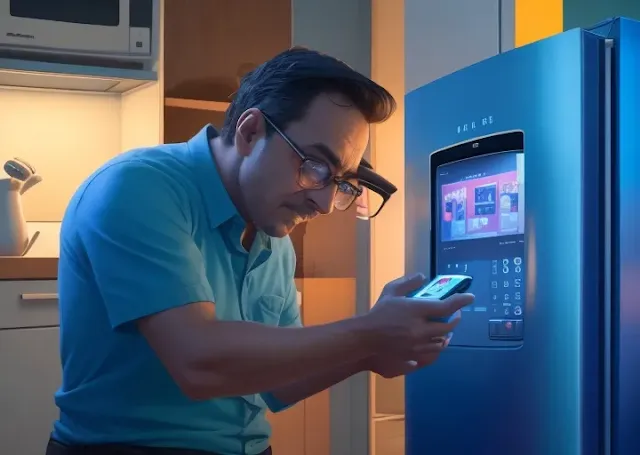Samsung Unveils Next-Level Bixby AI Generative Tech to Revolutionize Home Appliances
Revolutionizing Home Appliances: Samsung Unveils Next-Level Bixby AI Generative Tech for 2024 - In the ever-evolving world of technology, Samsung Electronics is taking significant steps to revolutionize the world of home appliances by introducing the latest Generative AI technology to their virtual assistant, Bixby. In this news article, we will explore Samsung's ambitious plan to transform how we interact with our home appliances. Let's delve deeper into how this Generative AI technology will bring us smarter and more efficient home appliances by 2024.
Samsung and the Vision of AI-Powered Homes
Samsung has long been a major player in the technology world, but when it comes to virtual assistants, Bixby may not always have been at the forefront compared to competitors like Alexa, Google Assistant, and Siri. However, with a determination to advance, Samsung has decided to bring in Generative AI, a more advanced form of AI, into Bixby. At their press conference at IFA Berlin 2023, Samsung unveiled their plans to integrate Generative AI into all their Bixby-powered home appliances starting in 2024.
Samsung has a clear vision of bringing AI-powered homes to reality. Currently, Bixby-powered home appliances can understand specific and precise voice commands. However, with Generative AI, Bixby will be capable of understanding complex sentences with more than two meanings, paving the way for more customized operations for customers. This is a significant step towards appliances that can recognize stored items, identify cooking ingredients, and offer cooking suggestions. Let's take a closer look at the benefits, potential, and concerns surrounding AI-powered home appliances.
Benefits of AI-Powered Home Appliances
Efficiency and Convenience
One of the major benefits of AI-powered home appliances is the higher efficiency and convenience they offer to users. These appliances can understand complex sentences, execute complex instructions, and perform multiple tasks simultaneously. For example, smart kitchen appliances like ovens can identify the type of food being cooked and provide precise cooking suggestions. Smart refrigerators can detect the items stored inside and offer food recommendations based on their inventory. All of this makes our daily routines more efficient and convenient.
Personalized Experiences
With AI-powered home appliances, users can expect more personalized experiences. These appliances can learn consumption patterns and user behavior, automatically adapting to meet their needs. The Generative AI technology that Samsung is bringing in will allow Bixby to understand complex sentences with multiple meanings, providing richer responses that align with users' requests. This means interactions with home appliances will become more natural and tailored to users' preferences.
Environmental Impact
AI-powered home appliances can also have a positive impact on the environment. They can optimize energy usage, reduce wastage, and help lower energy costs. For instance, smart air conditioning systems can detect the presence of people in a room and automatically adjust the temperature to save energy. Additionally, these appliances can help reduce food wastage by providing timely cooking suggestions. All of these contributions can lead to a reduced carbon footprint and a more sustainable environment.
The Role of Generative AI in Bixby
Generative AI is a more advanced form of AI that can understand complex sentences and provide information in various ways. By incorporating Generative AI, Bixby will become more powerful in understanding complex sentences with more than two meanings. This means users can have more natural conversations with their devices, rather than giving single and direct voice commands.
AI in Current and Future Home Appliances
Samsung's plan to introduce Generative AI is effective in transforming how people interact with their home appliances. From recognizing cooking ingredients in their ovens to offering cooking suggestions or identifying items stored in their refrigerators, appliances powered by Generative AI can do more than their previous-generation counterparts. Samsung is also working on updated chipsets for ultra-low power usage, allowing appliances with always-on AI intelligence to assist customers.
Customized Solutions for Customer Needs
Samsung is taking a customer-centric approach by incorporating AI features that can offer tailored solutions based on customer behavior and patterns. These customized solutions may include identifying user habits and preferences, optimizing energy consumption, and reducing wastage. With AI home assistants, users can manage their home's temperature, set tasks for their appliances, and even place grocery orders, making their lives more manageable.
Competition in the AI Assistant Space
The competition to dominate the AI assistant space is fierce, and Samsung is positioning itself as a new player with Generative AI-powered Bixby. With more personalized experiences, efficient energy usage, and a positive environmental impact, Samsung's home appliances with AI features can be a game-changer for users. It's clear that Samsung is the future of AI-powered home appliances, and the future looks promising.
Privacy and Security Concerns
When it comes to integrating AI into appliances, one of the main concerns is data privacy and security. Samsung has reassured customers that their data will be protected with strong security measures. All data collected from home appliances will be securely encrypted and transmitted to Samsung's servers. No third-party vendors will have access to this data.
Furthermore, Samsung is giving users full control over their data. Users can manage their data sharing preferences and even opt out of sharing their data with third-party vendors. Samsung is also committed to regularly releasing security updates to enhance user data protection.
Conclusion
With Samsung's plan to introduce Generative AI into its home appliances by 2024, we can see a bright future for how we interact with our home appliances. Generative AI technology will bring us smarter, more efficient home appliances. While there are concerns about privacy and security, Samsung has taken strong measures to protect customer data. With this advanced technology, the future of AI-powered home appliances looks promising, and Samsung will continue to lead the way.

